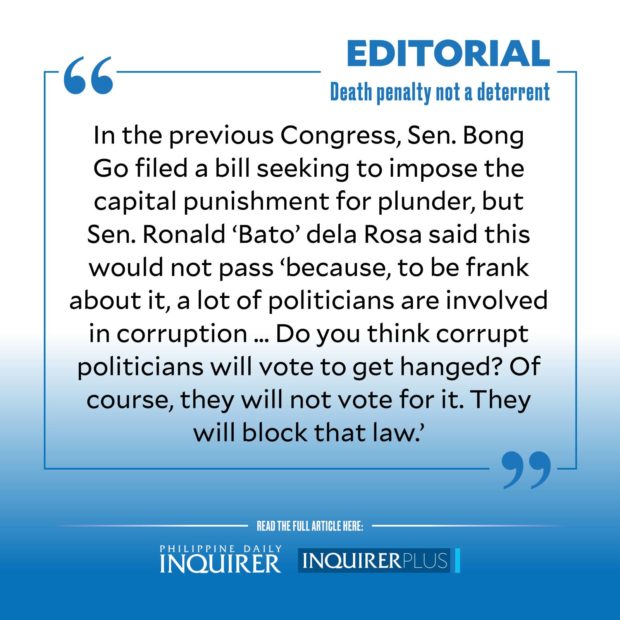Whenever a heinous crime takes place, or crime rates go up, officials who want to project an anticrime, law-and-order image begin calling for a return of the death penalty.
The justification for this is that the threat of capital punishment instills so much fear in the hearts of criminals that they would turn over a new leaf. Unsaid is also the desire to exact revenge from criminals, in response to the age-old call for “an eye for an eye, a tooth for a tooth.”
And yet, as the American Civil Liberties Union puts it, “the death penalty has no deterrent effect.”
In the US, “states that have death penalty laws do not have lower crime rates or murder rates than states without such laws. And states that have abolished capital punishment show no significant changes in either crime or murder rates.”
Locally, when the death penalty was abolished in 2006, data showed that the crime rate inched up in 2009, while the number went down from 2010 until 2012, rising again in 2013. But the fluctuations in the count of so-called “index” crimes “can be traced to changes in the system of crime reporting and inconsistencies in recording crime, not to actual spikes or dives in the number of crimes committed.”
If there is a single factor that gave rise to a spike in the number of crime-related deaths in recent years, it is not the absence or rarity of a death penalty verdict. Rather, it’s the government’s own anti-illegal drugs campaign, which in a way has been its way of imposing the death penalty without going through the courts.
The International Criminal Court (ICC), which is conducting an investigation into the alleged widespread extrajudicial killings of drug suspects here, as well as local and international human rights organizations, have estimated that from 12,000 to 30,000 civilians were killed in the course of the Duterte drug war between 2016 and 2019. The government, though, estimates the number of deaths at “only” 6,000 who died in the course of over 200,000 anti-illegal drug operations as of May this year.
No wonder, then, that a senator, who was the lead enforcer of the anti-illegal drug campaign during the Duterte administration and was the initial architect of the bloody war on drugs, is one of the leading advocates for the restoration of the death penalty. Sen. Ronald “Bato” dela Rosa has refiled a bill restoring capital punishment, along with Surigao del Norte Rep. Robert Ace Barbers.
This despite the fact that the Philippines is a signatory to international treaties banning the imposition of death penalties, particularly the Second Optional Protocol to the International Covenant on Civil and Political Rights, which is the only global treaty that explicitly prohibits executions and provides for total abolition of the death penalty.
Barbers, however, is not deterred, declaring that the majority’s will should prevail over any mandate imposed by international organizations.
But international law expert William Schabas, as reported by another newspaper in 2019, stated that the Philippines will no longer be able to enter future international treaties should the death penalty be reimposed as it would earn a global reputation of being unable to abide by its word. This is also because of then President Duterte’s decision in 2018 to withdraw Philippine membership from the Rome Statute which created the ICC, after The Hague-based court launched an investigation against him for committing crimes against humanity.
If Dela Rosa and Barbers succeed in their move to reinstate the death penalty, the Philippines would be the first country after North Korea to, in Schabas’ words, openly challenge an international treaty and would end up with the ignominy of being an international outlaw.
That seems to matter little to death penalty advocates, however. After all, recent history has shown a dismaying willingness among officials and authorities (and their supporters) to ignore basic principles in law.
There is no lack of glaring examples: the thousands of deaths resulting from the war on drugs, the continued detention (and petty harassment) of former senator Leila de Lima who has yet to be convicted of a crime, and the egregious miscarriages of justice that saw the favoring of a slew of rich and influential suspects, from the Marcoses to former presidents Estrada and Arroyo, all the way to the Pharmally gang.
In the previous Congress, Sen. Bong Go filed a bill seeking to impose the capital punishment for plunder, but Dela Rosa said this would not pass “because, to be frank about it, a lot of politicians are involved in corruption … Do you think corrupt politicians will vote to get hanged? Of course, they will not vote for it. They will block that law.”
His candid comments only reinforce the notion that the Philippine political and justice systems are shaped and influenced by vested interests, with corruption rampant even in the administration of justice.
With such a skewed justice system in place, how can we believe the death penalty, if reimposed, will be applied justly, judiciously, and in pursuit of the common good?
